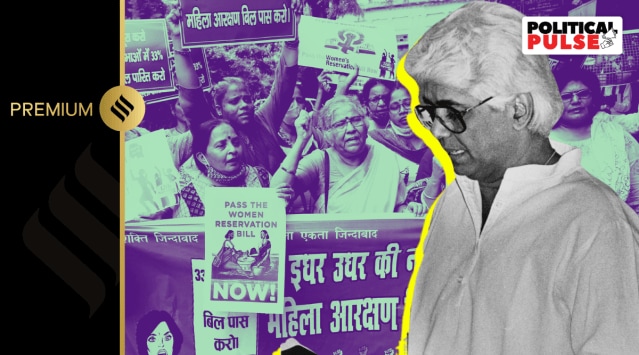‘There was broad consensus in 1996 on women’s quota… it could have passed. But govt fell’: Former law minister behind first Bill
"The opponents said elected women would largely be from cities and upper strata... (But) India is not what you see in the LS... The thought was If women could come in... the real voice of the country would be heard by everyone": Ramakant Khalap
 Former Union law minister Ramakant Khalap is now in Congress.
Former Union law minister Ramakant Khalap is now in Congress. Amid speculation that the women’s reservation Bill could be introduced during the special session of Parliament currently underway, former Union law minister Ramakant Khalap — who was then in the Maharashtrawadi Gomantak Party (MGP) and is now in the Congress — and who had first introduced the Bill in the Lok Sabha in 1996 when the United Front coalition government was in power, speaks to The Indian Express.
Excerpts:
What were the circumstances when the women’s reservation Bill was first introduced in 1996?
There was a lot of political instability in 1996. Atal Bihari Vajpayee formed a government for 13 days, but could not garner a majority and resigned. Other parties got together and elected H D Deve Gowda as chief of this national (United) front, which was supported by the Congress. So, it was a set-up that consisted of different political parties, described as ‘Bhanumati ka Kunba’ by Vajpayee. Afterwards, when elections took place, he (Vajpayee) returned to power, leading another ‘Kunba (clan)’.
But certain minimum programmes have to be agreed upon when such types of governments are formed, and one of them was on giving representation to women. Women’s representation in legislatures, Parliament and even municipalities and panchayats, was abysmally low. It is to Rajiv Gandhi’s credit that the Constitution was amended to provide representation to women in local bodies.
The issue was being discussed by Deve Gowda and some political leaders of the time. Being the Law Minister, I was entrusted with framing an appropriate amendment to the Constitution. We presented the Bill, but unfortunately, some people in the (United) Front itself were not on board.
I remember I was with the PM. He said he will introduce the Bill. Then the discussions took place. I was gheraoed by all the women Members of Parliament in the lobby. They were very happy and profusely congratulated me for taking the lead in preparing and introducing the Bill in the House.
It was a short-lived government. Then, elections took place and everyone seemed to have forgotten about the Bill. Today, I am happy that after over two decades, the Bill is once again being talked about.
And the BJP, which is the ruling dispensation, is talking of giving representation to women, while in the good old days, they were not very happy about it. A total change of heart or mind appears to have taken place. It’s good if they bring the Bill, and I hope it goes through. Of course, reservation is a wider issue and by and large, the right-wing opinion in the country has historically been against any type of reservation.
Which parties or leaders opposed the Bill? What was the sticking point?
I remember Mulayam Singh Yadav, the Uttar Pradesh chief minister at the time, did not appear to be in favour of the Bill. A famous statement by a politician at the time was ‘Kisko jaega ye representation? Kaun aayenge (Who will get the representation? Who will enter the House)? Ladies with bob-cut hair?’… That created a lot of ruckus in the House. It was denigrating to women. Simultaneously, attempts were made to oppose the Bill on every flimsy ground.
If I can recollect, Mulayam Singh Yadav, Sharad Yadav… opposed the Bill. Their idea was not to oppose women as such. They felt that by and large, women in our country are not in public life, and those who are, belong to a creamy layer, the upper strata and intelligentsia of society. Their concern was that if the Bill is passed, these seats will be cornered by women from this particular section of society.
There was a broad consensus… The Bill wasn’t introduced suddenly, but was a culmination of discussions that went on for years, leading to an apparent consensus in 1996. And it could have been passed (then). But, it was decided that being a major issue where you have to amend the Constitution, you want to get the opinion of everyone. And so it was referred to a Joint Parliamentary Committee for deliberations.
In those days, the unfortunate part was that there was no stability in government. This (United) Front, first under Deve Gowda and then under I K Gujral, lasted a short period, and then the whole thing collapsed.
Thereafter, the Bill hasn’t become a main plank in the political discourse. Some half-hearted attempts were made to pass it. These attempts should have been made by a ruling consensus.
What about parties that seek a quota within the quota for marginalised women?
My view was if we accept as a concept that women of India need representation at the political level… there already is such representation in local bodies, it’s a natural progression that it is taken upwards in the Legislative Assemblies, and in the Lok Sabha too.
But then who, according to them (the opponents), are these women who would grab these reservations. Their thinking was that these women would largely be from cities and from upper strata of society. And women in the Lok Sabha did belong to that sort of intelligentsia at that time. So, the concern was what would happen if the law comes in — will these seats be cornered by a select few?
In those days in the Lok Sabha, there were also women who had come from the poorest of backgrounds. India is not what you see in the Lok Sabha or otherwise. India is in the villages. And that was the thought (behind the Bill)… If at all women could come into the Lok Sabha, the real voice of the country would be heard by everyone. It would be a mix, of course.
After women’s reservation has come in local bodies, I think a large number of women have risen at the panchayat level. It is a revolution in a way, and must percolate upwards into the Assemblies. It will be a good thing and it could be there for, say, the next 25 years. The Bill had caught the attention of people at large, and the press was quite open to it. The Indian Parliament would have got a different colour altogether, had it gone through.
What was the criteria for reservation in the draft Bill?
There were two things. First was vertical representation, which is one-third reservation across the board, and the demand for horizontal representation, which related to whether there should be a reservation for OBCs, SCs and STs within the quota.
Second, there should not be any problem regarding percentages, because by and large, half the population is male and half female. Therefore, there weren’t any other criteria as such.
What about a sunset clause? Was it there in the 1996 draft Bill?
This clause was not there in the 1996 Bill, because that would have to be another amendment. Once society attains a certain level of enlightenment in terms of representation in the Lok Sabha or, say, financial strength, and education reaches a certain acceptable level, you can do away with this type of reservation. I think if the Bill is passed now, the target should be to continue it till the hundredth year of Independence.



- 01
- 02
- 03
- 04
- 05




























